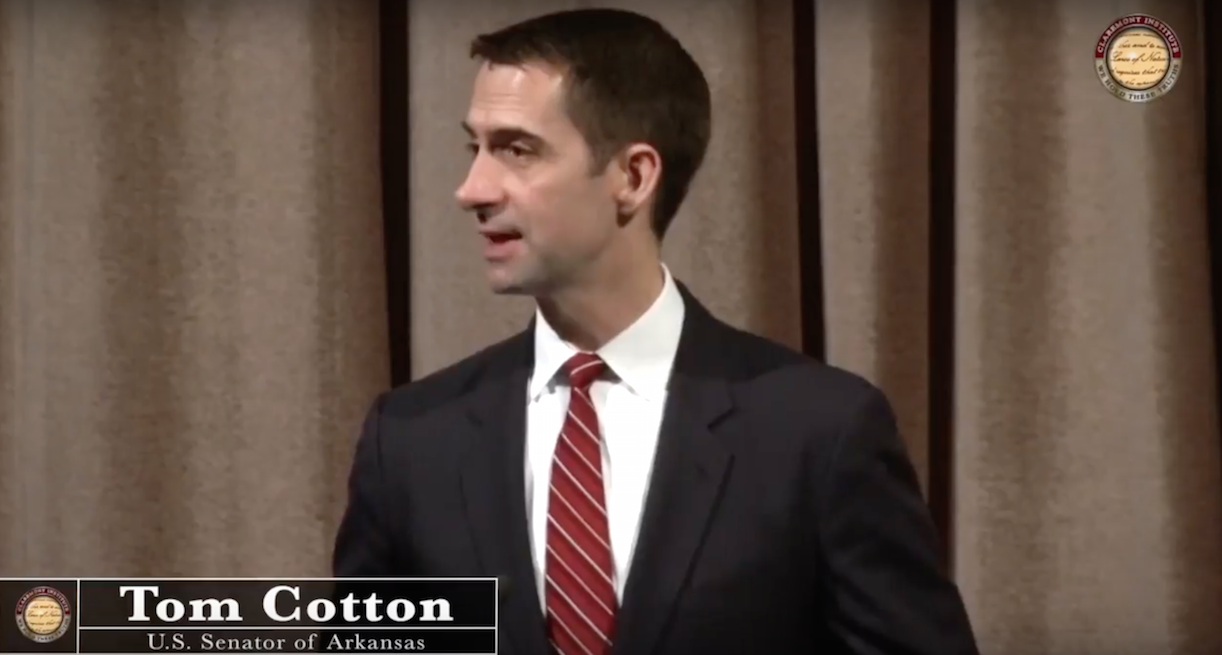Radical self-definition destroys the self and the nation.
Against the Global Good

America’s superior power is not a moral entitlement.
Senator Cotton’s reflections on citizenship and statesmanship are central to the recent debate over the meaning of “nationalism,” a word that has recently come under attack. At stake is the question: what does it mean to be an American? Is being an American a function of blood, race, or language, or is it something else?
In his remarks, Sen. Cotton argues that what unites American citizens “is a shared way of life toward shared purposes, which finds its most direct expression in the laws we make for ourselves through our elected representatives.” Cotton reminds us that Winston Churchill, like Lincoln before him, located the “’highest expression’ of these ideas in the ‘American Declaration of Independence.’” The core of American “nationalism” is indeed the principles arising from the Declaration. But much of today’s debate conflates two types of nationalism: ethnic and civic.
The former is based on language, blood, or race. American nationalism is the latter, civic in nature, holding that the United States is a nation based on a set of beliefs—a creed—rather than race or blood. This understanding of nationalism is equivalent to “patriotism,” not, as surprisingly many commentators now assert, opposite to it.
Abraham Lincoln articulated nationalism’s American meaning in a speech he delivered in Chicago on 10 July, 1858. In it, he noted that many citizens of the United States cannot trace their lineage back to the Founders by blood, but:
when they look through that old Declaration of Independence they find that those old men say that “We hold these truths to be self-evident, that all men are created equal,” and then they feel that that moral sentiment taught in that day evidences their relation to those men, that it is the father of all moral principle in them, and that they have a right to claim it as though they were blood of the blood, and flesh of the flesh of the men who wrote that Declaration, and so they are.
This “electric cord” links “the hearts of patriotic and liberty-loving men together,” and “will link those patriotic hearts as long as the love of freedom exists in the minds of men throughout the world.”
Although the United States is founded on universal principles articulated in the Declaration of Independence, rights and liberties can exist only in separate and independent nation-states, where the just powers of government are derived from the consent of the governed. American civic nationalism is still a function of sovereignty.
American nationalism is based on the idea of a political community where citizens, whether foreign-born or native-born, have reciprocal responsibilities to one another and to government. George Washington captured this relationship in his 1790 letter to the Hebrew Congregation of Newport, Rhode Island:
The citizens of the United States of America have a right to applaud themselves for having given to mankind examples of an enlarged and liberal policy—a policy worthy of imitation. All possess alike liberty of conscience and immunities of citizenship.
It is now no more that toleration is spoken of as if it were the indulgence of one class of people that another enjoyed the exercise of their inherent natural rights, for, happily, the Government of the United States, which gives to bigotry no sanction, to persecution no assistance, requires only that they who live under its protection should demean themselves as good citizens in giving it on all occasions their effectual support.
So American nationalism is patriotism and American statesmanship must be directed toward reifying this patriotism. American power’s sole purpose must be securing the American Republic, protecting its liberty, and facilitating American prosperity. It should not be facilitating the “global good,” that is, a corporatist globalism divorced from patriotism or national greatness. America’s superior power is not a moral entitlement, even when wielded in the name of the global good; its maintenance requires constant vigilance. A healthy regard for the safety and happiness of American citizens requires that U.S. power remain supreme. But statecraft requires persuading American citizens that maintaining our supremacy is both just and in their interest.
The purpose of American power is to act in our own interest, not to act in the interest of others, the “international community,” or international institutions. Senator Cotton has articulated the proper basis of citizenship and statesmanship.
The American Mind presents a range of perspectives. Views are writers’ own and do not necessarily represent those of The Claremont Institute.
The American Mind is a publication of the Claremont Institute, a non-profit 501(c)(3) organization, dedicated to restoring the principles of the American Founding to their rightful, preeminent authority in our national life. Interested in supporting our work? Gifts to the Claremont Institute are tax-deductible.
The elite imagination is no longer the happiest place on Earth.
Protecting our regime demands more attention to reality than to realism.
With values and interests in tension, exceptionalism points in more than one direction.
Can America recover a nationalist vision of world leadership?





